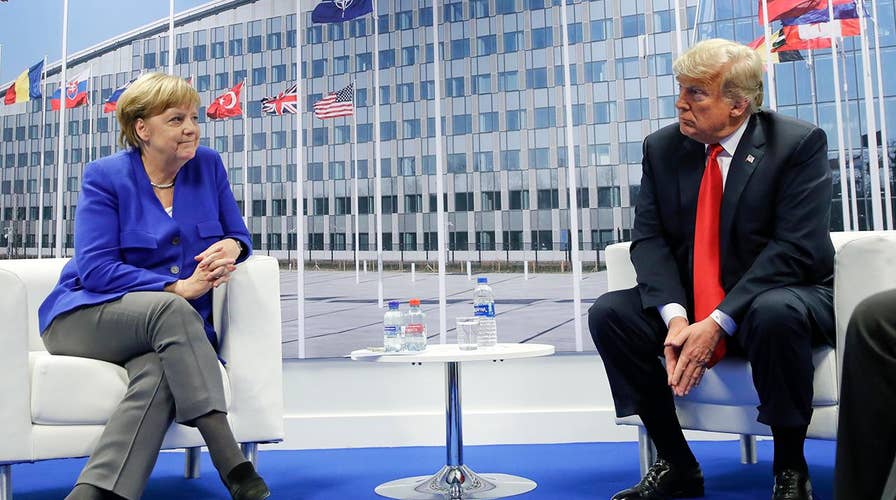Trump singles out Germany for its energy deals with Russia
President Trump suggests that new natural gas pipeline will result in Moscow controlling Berlin; chief White House correspondent John Roberts reports from Brussels.
BRUSSELS – President Donald Trump claimed a pipeline project has made Germany "totally controlled" by and "captive to Russia" during a combative breakfast Wednesday that kicked off what was already expected to be a fraught NATO summit.
Trump, in a testy exchange with NATO Secretary General Jens Stoltenberg, took issue with the U.S. protecting Germany when the European nation is making deals with Russia.
The president appeared to be referring to the Nord Stream 2 pipeline that would bring gas from Russia to Germany's northeastern Baltic coast, bypassing Eastern European nations like Poland and Ukraine and doubling the amount of gas Russia can send directly to Germany. The vast undersea pipeline is opposed by the U.S. and some other EU members, who warn it could give Moscow greater leverage over Western Europe.
Trump, in a message to Germany, asked why the U.S. should "protect you against Russia" when the two countries are making deals.
"You tell me, is that appropriate?" he asked, adding that: "Germany is totally controlled by Russia."
He later said that, "Germany as far, as I'm concerned, is captive to Russia" and urged NATO to look into the issue. Trump was expected to see German Chancellor Angela Merkel later in the day.
Stoltenberg pushed back, stressing that NATO members have been able to work together despite their differences.
The dramatic exchange set the tone for what was already expected to be a tense day of meetings with leaders of the military alliance. Trump is expected to continue hammering jittery NATO allies about their military spending during the summit meeting, which comes amid increasingly frayed relations between the "America first" president and the United States' closest traditional allies.
Trump said as he arrived at the breakfast that the situation is "not fair to the taxpayers of the United States but we will make it fair."
"They will spend more," he later predicted. "I have great confidence they'll be spending more."
Trump has been pushing NATO members to reach their agreed-to target of spending 2 percent of their gross domestic products on national defense by 2024 and has accused those who don't of freeloading off the U.S.
"Many countries in NATO, which we are expected to defend, are not only short of their current commitment of 2% (which is low), but are also delinquent for many years in payments that have not been made," he tweeted Tuesday while en route to Europe, asking: "Will they reimburse the U.S.?"
That's not how the spending words. The 2 percent represents the amount each country aims to spend on its own defense, not some kind of direct payment to NATO or the U.S.
NATO estimates that 15 members, or just over half, will meet the benchmark by 2024 based on current trends.
During his campaign, Trump called NATO "obsolete" and suggested the U.S. might not come to the defense of members if they found themselves under attack — a shift that would represent a fundamental realignment of the modern world order. He also called Brussels a "hell hole" and "a mess." Trump has moderated his language somewhat since taking office, but has continued to dwell on the issue, even as many NATO members have agreed to up their spending.
Stoltenberg, for his part, has credited Trump for spurring NATO nations to spend more on defense, noting that the Europeans and Canada are projected to spend around $266 billion more by 2024. He said Wednesday that last year's increases marked the largest in a generation.
Arriving for his meeting with Stoltenberg, Trump told the NATO chief that "because of me they've raised about $40 billion over the last year. So I think the secretary general likes Trump. He may be the only one, but that's OK with me."
Trump was also participating in a welcome ceremony, a meeting of the North Atlantic Council and a working dinner with some of the same leaders he berated over trade during his last world leaders summit in Canada last month.
Brussels is the first stop of a week-long European tour that will include stops in London and Scotland, as well as a highly anticipated meet with Russia's Vladimir Putin.
Trump predicted as he departed Washington that the "easiest" leg of his journey would be his scheduled sit-down Putin — a comment that did little to reassure allies fretting over his potential embrace of a Russian leader U.S. intelligence officials accuse of meddling in the 2016 elections to help Trump win.
On the eve of the NATO summit, European Council President Donald Tusk pushed back against Trump's constant criticism of European allies and urged him to remember who his friends are when he meets with Putin in Helsinki.
"Dear America, appreciate your allies, after all you don't have all that many," he said.
__
Associated Press writer Ken Thomas in Washington contributed.
__
Follow Colvin and Lemire on Twitter at https://twitter.com/colvinj and https://twitter.com/JonLemire








































